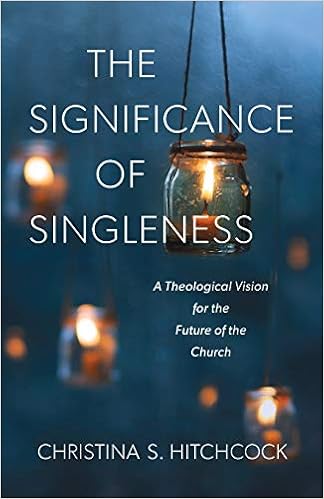In this much-needed book, theologian Christian Hitchcock develops a vision for singleness and the church. Recent evangelical tendencies, argues Hitchcock, view singleness as a problem rather than an asset, a curse rather than a blessing. Drawing from her own experiences as a single Christian woman, Hitchcock skillfully combines personal reflection, historical evidence, and biblical-theological support to claim that single persons are themselves a theologically significant group.
Hitchcock begins by tackling the problem of singleness head-on. She describes the perception of the “problem of singleness,” from pop culture to the Marriage Mandate Movement. In her view, American evangelicalism views marriage as the most desired social institution, under which nothing can compare. Most of her examples come from her experience as a student and professor at small Christian colleges, which have a notorious tendency to inflate issues of marriage. Hitchcock then turns to three figures from church history: Macrina, Perpetua, and Lottie Moon, showing how singleness strengthens Christian community, identity, and authority (respectively). She then concludes with a brief discussion of how singleness can be a prism through which other Christian teachings and actions can be viewed.
This book is easy to read and accessible to most readers, yet remains theologically profound. Hitchcock quotes ancient writers and recent online articles alike, showing the historical significance of singleness. An anticipated objection to this book may be its narrow audience; at the outset, it appears to be a book for single women, written by a woman, using examples of Christian women. However, I find Hitchcock’s scope to be much broader, particularly in the implications she draws. Hitchcock contributes to the growing voices of evangelical theologians, such as Wesley Hill, desiring to retrieve an ancient vision of singleness that informs the future church. Single persons and those in relationships alike will greatly benefit from Christina Hitchcock’s astute vision for the placement and role of singleness in the church. With aplomb, clarity, and wit, Hitchcock shows us why singleness is not a problem but a blessing to be recognized.
(A complimentary review copy was given in exchange for an honest review.)
Buy this book
Hitchcock begins by tackling the problem of singleness head-on. She describes the perception of the “problem of singleness,” from pop culture to the Marriage Mandate Movement. In her view, American evangelicalism views marriage as the most desired social institution, under which nothing can compare. Most of her examples come from her experience as a student and professor at small Christian colleges, which have a notorious tendency to inflate issues of marriage. Hitchcock then turns to three figures from church history: Macrina, Perpetua, and Lottie Moon, showing how singleness strengthens Christian community, identity, and authority (respectively). She then concludes with a brief discussion of how singleness can be a prism through which other Christian teachings and actions can be viewed.
This book is easy to read and accessible to most readers, yet remains theologically profound. Hitchcock quotes ancient writers and recent online articles alike, showing the historical significance of singleness. An anticipated objection to this book may be its narrow audience; at the outset, it appears to be a book for single women, written by a woman, using examples of Christian women. However, I find Hitchcock’s scope to be much broader, particularly in the implications she draws. Hitchcock contributes to the growing voices of evangelical theologians, such as Wesley Hill, desiring to retrieve an ancient vision of singleness that informs the future church. Single persons and those in relationships alike will greatly benefit from Christina Hitchcock’s astute vision for the placement and role of singleness in the church. With aplomb, clarity, and wit, Hitchcock shows us why singleness is not a problem but a blessing to be recognized.
(A complimentary review copy was given in exchange for an honest review.)
Buy this book

Comments
Post a Comment